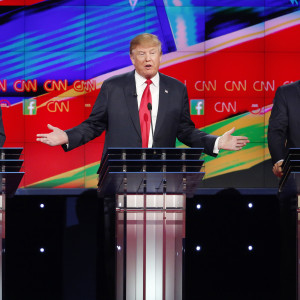National security was front and center on Tuesday night as nine presidential hopefuls took to the stage at the Venetian Hotel and Casino for the final Republican showdown of the year. Predictably contentious, the fifth GOP debate took place just as the vast majority of Americans are set to travel home for the holidays, and dinner tables across the country will listen as family members discuss the merits of our next would-be president.
The debate demonstrated just how much the political landscape has shifted in the four weeks since the last debate. Domestic policy is no longer king, instead — in the wake of San Bernardino and Paris — Tuesday’s gathering had an international twist. The candidates discussed how to best protect Americans from terror, both abroad and on the home front.
In November, prior to the mass shooting in San Bernardino that left 14 Americans dead, a New York Times poll found only 4 percent of Americans said terrorism was the most important problem facing the United States. Now, that number has risen to 19 percent. Further highlighting the public’s unease, 44 percent of Americans now believe an attack is “very likely” to happen in the next few months — the highest percentage expressing that belief since the weeks after 9/11.
It is no surprise, then, that our political conversation has turned from economic stagnation and job creation to safety and defense. Immigration — always a contentious issue — was now seen through this national security lens, with a focus on how to protect our border and better shield Americans from domestic terrorists. Perhaps it is more surprising the extent of Republican disagreement on this issue, as the candidates clashed and offered competing visions on the best approach.
Most candidates challenged Donald Trump’s call for Muslims to be temporarily barred from entering the United States. Former Florida Gov. Jeb Bush — who despite low polling numbers enjoyed what was perhaps his strongest debate yet — was particularly outspoken on this front, saying, “The idea that this is a solution to this is just crazy.” Candidate Rand Paul concurred, stating firmly, “I think if we ban certain religions, if we censor the Internet, I think that at that point the terrorists will have won.”
The candidates also offered competing visions on national security. Marco Rubio — who was attacked regularly throughout the night — called for ground forces to fight ISIS, consisting primarily of Sunni Arabs who reject ISIS on ideological grounds, while Ted Cruz — who has seen his stock soar in recent weeks — asserted that the United States should use “overwhelming air power” against the militant group. Paul urged a more isolationist approach, arguing against the overthrow of Bashar Assad in Syria. Paul noted that if the United States had gone through with its threat to bomb Syria for using chemical weapons, it’s likely that ISIS would have an even greater stronghold within the country today.
Donald Trump staunchly defended both his proposal to ban Muslims from entering the United States as well as his recent comments about “taking out” the families of members of ISIS. Trump also said he would work to prevent members of ISIS from using the Internet to recruit American fighters, even if it means completely shutting down parts of the web.
For many, the depth and degree of varying viewpoints reflect a current GOP identity crisis on foreign policy, one rife with internal division on how best to handle homeland security. These disputes may create an opening to be exploited by the eventual nominee’s ability to take on former secretary of state and presumptive Democratic nominee, Hillary Clinton, who criticized the GOP field on its national security views just hours ahead of the debate, saying, “Bluster and bigotry are not credentials for becoming commander-in-chief.”
While the election is still 11 months away and other topics will no doubt find their way to the forefront, Tuesday night’s showcase in Las Vegas suggests what is shaping up to be the defining issue of the 2016 election: national security. Politics will take a back seat to Santa and his elves over the next few weeks, but candidates should keep in mind that Americans are judging candidates more than ever on who is best suited to be our next commander-in-chief.

